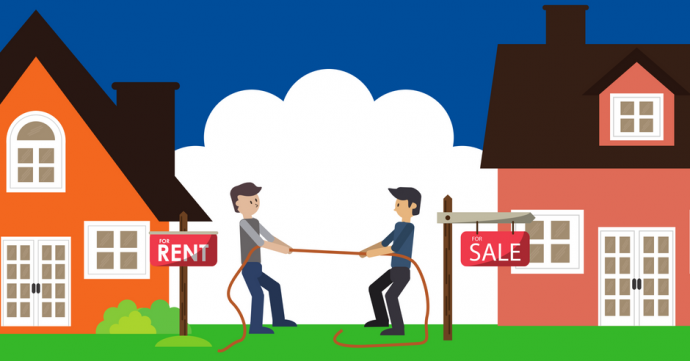Rent or Buy? When Is The Right Time to Rent or Buy a Home?
Renting vs. Buying a Home
It’s a conundrum most of us face at some time in our lives: to buy, or not to buy? The decision between renting a property, and scouting for a home to purchase is one that is entirely up to the person making it, based on their own personal and financial circumstances.
But what is right for you? Should you continue renting your current residence, or should you take the plunge and finally buy a property in that suburb you’ve always wanted to live in?
There is no one unequivocal answer, and deciding to buy or rent will depend on what you are looking for, what your personal circumstances are, and, ultimately, on what you can afford.
Calculate the Costs
Depending on market conditions in the city or suburb you want to buy or rent in, there may not be such a big difference between what the monthly rental cost or monthly mortgage is, but that definitely isn’t the end of the financial story.
Calculating the monthly costs associated with buying a home and comparing it to what it costs to rent a similar property will dictate what you might do, but that means taking into account all the costs of both options, keeping in mind what financial benefits they could hold.
Aside from just looking at what it costs to buy a property, people that are looking to acquire a property also have to keep in mind the maintenance expenses, down payment, property taxes, utilities and closing costs, among other things. Where one buys also has a significant impact one what properties will cost, and the interest rates on a property will surely also affect a decision to buy, or not.
On the other hand, many people consider buying the better option, due to the appreciation of a property over time. However, if you are not looking to stay in a particular area for at least the next few years, you might not be able to make the profits you might have when the time comes to sell the property.
When calculating what you can afford, speak to an expert, like a qualified real estate agent, to consider whether renting or buying is the more viable option for you. Your real estate agent will be able to take your current financial and personal circumstances into account when making recommendations, and will be able to explain exactly what costs you should be able to shoulder every month, should you decide to buy.
The New York Times released a useful calculator in 2014 to help potential buyers compare the cost of renting to buying, and while market conditions have changed significantly since then, using this tool will give you an idea of what factors you need to consider before making a final decision.
Buying Advantages
When pondering over buying a property, potential buyers should consider all the costs that are involved. The down payment, closing costs and other fees associated with the transfer of ownership of a property are considered the initial costs, while recurring costs include things like maintenance and renovation costs, mortgage payments, and property taxes.
Buying a property comes with a number of advantages.
- It is one of the most significant financial decisions you will make in your lifetime, and it goes without saying that owning a property comes with marked benefits over the long term, like security, equity, and the potential to grow your personal wealth.
- Buying a property gives you the freedom to alter the property as you see fit, without having to consult with the landlord before you renovate or make landscape or décor changes to the property.
- After buying the property, you may decide to rent it to other people, potentially generating another stream of income for yourself, whilst paying off your mortgage.
- Buying a property allows you to improve your credit profile, provided that you always make payments on time.
Buying Disadvantages
Of course, buying isn’t just advantageous, and comes with its own set of challenges.
- Homeownership comes with a range of unexpected costs that buyers are not always aware of. Rates, taxes and insurance can add considerable amounts to what you will already be paying for your mortgage, and may affect your decision to buy.
- Buying a home comes with a lot of financial responsibility, and will entail having to keep up with mortgage payments, while also making sure maintenance to the property is done on a regular basis.
- Whereas homeownership does give buyers a lot of stability, it may also lead to less flexibility and mobility on the homeowner’s behalf. Tenants can give one month’s notice and move out of a property, but homeowners will only be able to move once their property sells. If you don’t plan on living in a specific city or suburb for at least the next three years, and if your personal circumstances might require you to move again soon, renting might be the better option for you.
- Profits on the resale of a home are not guaranteed. The conditions of the property market are constantly changing, and economic factors like high interest rates or a recession could influence the price a property fetches when it is put on the market again. The desirability of a particular area might change over the course of the time you’re living there, and will almost certainly have an influence on the price you get for your property when you sell it again – which is why deciding where to buy is so important.
- Buying a property requires substantial capital upfront, and comes with loads of paperwork.
Renting Advantages
When renting a property, the initial costs may include the rent deposit and agent’s fee (depending on whether it is charged or not), while the recurring costs are made up of the monthly rental fee and perhaps additional insurance on the contents of the property.
Deciding to rent a property instead of buying can hold significant benefits for the renter.
- The flexibility that comes with renting a home makes it the designated choice for young professionals that might be faced with changes in their personal circumstances, like suddenly having to relocate for professional reasons. The freedom of giving notice, packing up and moving makes renting an attractive option to people who are not quite settled yet.
- There are fewer upfront costs and paperwork associated with renting than with buying.
- Finding someone to take over the lease is not the responsibility of the renter. Conversely, homeowners (together with their real estate agents) bear the full responsibility of finding someone to purchase their property.
- Maintenance and homeowners’ insurance is the responsibility of the landlord, and the tenant will only be responsible for the insurance of the contents of the home.
- If rental costs in a specific are are a little lower than the cost of buying, renters may be able to live in a suburb or city they wouldn’t be able to buy property in.
- Recurring monthly costs are restricted to the monthly rental fee, which means that renters can use the money they save on other investments, like saving to buy a property or investing in the stock market or other financial endeavours.
- Fluctuating home values do not directly affect the renter.
Renting Disadvantages
Renting isn’t all moonlight and roses, and can restrict renters in a number of ways.
- The lease agreement between a tenant and their landlord prevents them from renovating or altering the property. They will also be bound in terms of the ways in which they are allowed to use the property.
- Often, a rental agent acts as an intermediary between the tenant and the landlord. Because a third party is involved, any matters that arise with the property may take longer to be resolved.
- Because the property does not legally belong to the tenant, there is no return on investment when renting a property, and no possibility of accumulating or creating wealth.
- When a lease expires, there is no guarantee that it will be renewed, and the landlord may decide to sell the property at any given time.
- Renters will have to abide when the rent is raised every year, and will have no say about increases, which are dependent upon inflation.
- The variety available to renters may be more limited, as they depend on available vacancies.
Conclusion
Choosing between renting and buying a property is entirely dependent on the personal and financial circumstances of the person facing the decision. Buying and renting come with their own advantages and disadvantages, and these pros and cons will dictate the way in which prospective buyers or renters decide to proceed.
If flexibility and less financial and maintenance responsibility is what you are looking for, renting may be the better option, but if you are looking for stability, assets and a property you can truly call your own, you might rather want to consider buying.
Still stumped and need a professional’s advice? Let Perfect Agent’s extensive list of qualified and experienced real estate agents give you their expert opinion and help you decide.




